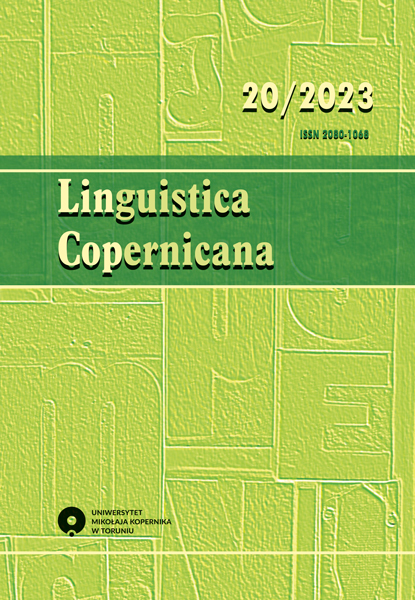Lying and two modes of speaking
DOI:
https://doi.org/10.12775/LinCop.2023.009Keywords
lying, theory of speaking, semantics of verbsAbstract
The article is a commentary on Andrzej Bogusławski's lecture given on 9th October 2021. It was devoted to lies and false statements. The paper recalls also the basic philosophical and linguistic controversies regarding the concept of 'lying'. The author claims that the observation of possible word arrangements in a natural language allows to resolve issues stated by philosophers and linguists. According to her, the basic exponent of a lie is the polish predicate [ktośi] okłamał [kogośj]. The content of this predicate includes two notions of 'speaking' characterized and described earlier by A. Bogusławski (2021). This predicate determines the knowledge of the actual speaker and the liar as to the logical value of the proposition in question. In addition, it expresses a negative assessment of the liar's actions and his desire to mislead his hearer. In its last part the article shows the differences between two competing exponents of 'lie' in Polish - [ktośi] okłamał [kogośj] i [ktośi] skłamał [komuśj].
References
Antas J., 1999, O kłamstwie i kłamaniu. Studium semantyczno-pragmatyczne, Kraków: Universitas.
Augustyn, św.; De mendacio / On lying, tłum. R.H. Browne, [online:] https://www.newadvent.org/fathers/1312.htm [dostęp: 15.08.2023].
Benton M.A., 2016, Gricean Quality, Nous 50 (4), s. 689–703.
Benton M.A., 2018, Lying, believe and knowledge, w: J. Meibauer (red.), The Oxford Handbook of Lying, Oxford: UOP, s. 120–133.
Bogusławski A., 2004, Remarks on quotative saying, Studies in Polish Linguistics 1, s. 29–45.
Bogusławski A., 2005 (2011), Veredicum laudare necesse est, vitam sustinare non est necesse, Journal of Pragmatics 37, s. 411–431; przedruk w: tegoż, Roztrząsania nadlingwistyczne, Warszawa: BEL Studio, s. 51–74.
Bogusławski A., 2007, A Study in the Linguistics-Philosophy Interface, Warszawa: BEL Studio.
Bogusławski A., 2008, Semantyka, pragmatyka: leksykografa głos demarkacyjny, Warszawa: Takt.
Bogusławski A., 2011, Roztrząsania nadlingwistyczne, Warszawa: BEL Studio, s. 51–74.
Bogusławski A., 2021, Lingwistyczna teoria mowy: preliminaria, Warszawa: WUW.
Boguslawski A., 2023, Wybrane obserwacje logiczno-lingwistyczno-filozoficzne, Warszawa.
Bok S., 1999, Lying. Moral choice in private and public life, New York: Vintage Books/Kindle Edition.
Carson T., 2010, Lying and Deception: Theory and Practice, OUP Oxford. Kindle Edition.
Chishom R.D., Feehan T.D., 1977, The Intend to Deceive, Journal of Philosophy 74, s. 143–159.
Chudy W., 2003, Filozofia kłamstwa, Warszawa: Oficyna Wydawnicza Volumen.
Coleman L., Kay P., 1981, Prototype Semantics. The English Word Lie, Language 57 (1), s. 26–44.
Fallis D., 2012, Lying and as a Violation of Grice’s First Maxim of Quality, Dialectica 66 (4), s. 563–581.
Falkenberg G., 1982 (2017), Lüngen. Grundzüge einer Theorie sprachlichter Täuschung. Tübingen: Niemeyer; Kłamstwo. Zarys teorii językowego wprowadzania w błąd (fragmenty), tłum. E. Drzazgowska, komputeropis.
Frankfurt H., 2005 (2008), On Bullshit, Princeton: PUP; O wciskaniu kitu, tłum. H. Pustuła-Lewicka, Warszawa: Wydawnictwo Czuły Barbarzyńca.
Frege G., 1977, Pisma semantyczne, tłum. B. Wolniewicz, Warszawa: PWN. Kucharski J., 2014, Usprawiedliwione kłamstwo we współczesnej etyce stosowanej, Kraków: Wydawnictwo WAM.
Lackley J., 2013, Lies and Deception: An Unhappy Divorce, Analysis 73(2), s. 236–248.
Mahon J.E, 2016, The Definition of Lying and Deception, w: E. N. Zalta (red.), The Stanford Encyclopaedia of Philosophy, [online:] https://plato.stanford.edu/archives/win2016/entries/lying-definition [dostęp 15.07.2023].
Mahon J.E., 2018, Contemporary approaches to the philosophy of lying, w: J. Meibauer (red.), The Oxford Handbook of Lying, Oxford: UOP, s. 32–55.
Meibauer J., 2014, Lying at the Semantics-Pragmatics Interface, Mouton Series in Pragmatics, De Gruyter. Kindle Edition.
Meibauer J., 2018, Lying, implicating, presupposing, w: J. Meibauer (red.) The Oxford Handbook of Lying, Oxford: UOP, s. 193–202.
Pelc J., 1990, O pojęciu kłamstwa z punktu widzenia semiotyki, Studia Semiotyczne XVI–XVII, s. 89–97.
Puczyłowski T. A., 2018, Uwagi o kłamstwie i kłamaniu na kanwie pracy Jerzego Pelca O pojęciu kłamstwa z punktu widzenia semiotyki, Przegląd Filozoficzny. Nowa seria 2, s. 165–184.
Puzynina J., 1992, O kłamaniu i kłamstwie, w: Język wartości, Warszawa: Wydawnictwo Naukowe PWN, s. 186–202.
Saul J. M, 2012, Lying, Misleading and What is Said. An Exploration in Philosophy of Language and in Ethics, Oxford: OUP.
Sorensen R., 2007, Bald-faced lies. Lying without the intend to deceive, Pacific Philosophical Quarterly 88 (2), s. 251–264.
Stalnaker R., 2002, Common Ground, Linguistics and Philosophy 25 (5–6), s. 701–721.
Stokke A., 2018, Lying and Insincerity, Oxford: OUP. Tomasz z Akwinu, św., 1975–1983, Suma teologiczna, tłum. S. Bełcha, Londyn: Veritas, II–II q. 110 a 1–4, s. 26–44.
Wierzbicka A., 2006, Semantyka: jednostki elementarne i uniwersalne, Lublin: Wydawnictwo UMCS.
Wikipedia, [online:] Aleksander Kwaśniewski – Wikipedia, wolna encyklopedia [dostęp 05.10.2023].
Downloads
Published
How to Cite
Issue
Section
License
Copyright (c) 2024 Joanna Zaucha

This work is licensed under a Creative Commons Attribution-NoDerivatives 4.0 International License.
Stats
Number of views and downloads: 512
Number of citations: 0



